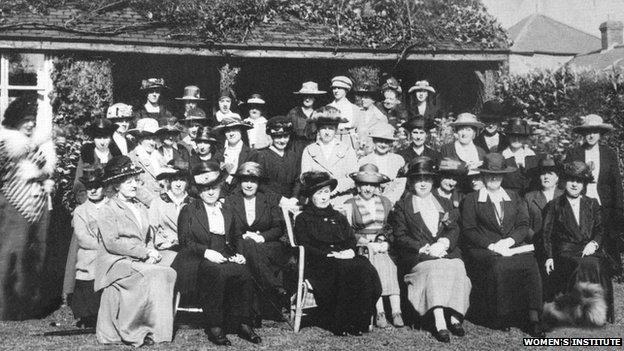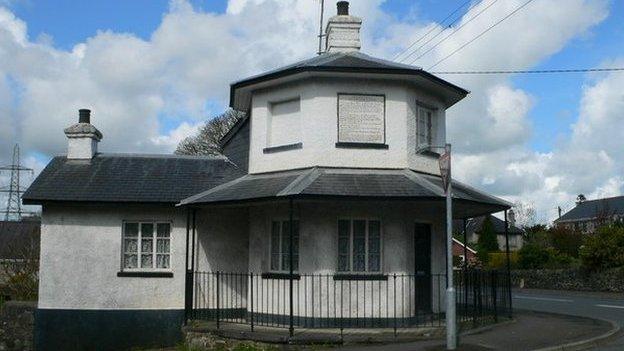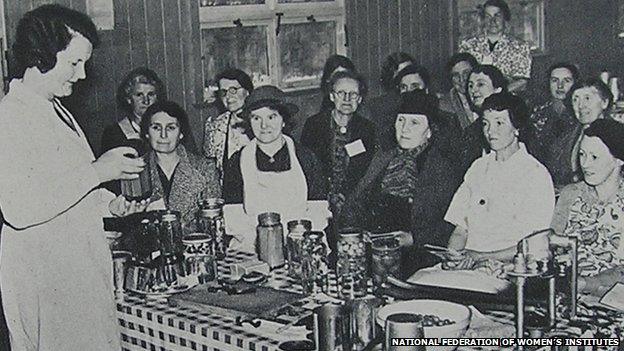First Women's Institute was in Wales to help war effort
- Published

The first Women's Institute was started up to help the war effort
With its image of jam and Jerusalem, few organisations seem more quintessentially English than the Women's Institute.
But when Britain's first WI federation was founded in September 1915, it was not in Sussex or the Home Counties, but at Llanfairpwll in the heart of Anglesey.
The concept originated from Stoney Creek, Ontario, where in 1897, the Farmer's Institute brought together isolated women from rural Canada, to discuss the challenges of living off such a vast land.
They were given training in home economics, child care and keeping chickens.
It was to one of these Canadian founding mothers that the British government turned at the outbreak of World War One, when the country found itself at the mercy of a German naval blockade, and only able to meet a third of its food requirements.
Armed with her experience of mobilising Canadian women to maximise food production, Madge Watt, often known as Mrs Alfred Watt, toured the length and breadth of Britain to spread the WI word.
But as Audrey Jones, current chairman of the Anglesey Federation of WI explains, it was in Llanfairpwll where the bug first bit.

Llanfairpwll's former toll house hosted some of the village's first WI meetings
Making history
"The Agricultural Organisation Society invited women from across north Wales to a meeting at Bangor University, where Mrs Alfred Watt apparently spoke extremely passionately about what all of them could do for the war effort," said Mrs Jones.
"Immediately after that, the group from Llanfairpwll met and passed a resolution, and became the first British WI federation.
"The Marquess of Anglesey donated land for a meeting place, and the women bought an officers' mess from Kinmel Bay army camp to put on the site.
"In 1916 a Girls' Institute was set up to teach over 14s about adult life, and shortly after came the first children's clinic at the Tall House."
But if it seems unusual that Britain's first federation was formed in Wales, then it is stranger still that the driving force behind WI on Anglesey was in fact a man.
In almost a century, Colonel Richard Stapleton-Cotton and his dog Tinker are the only two males ever to be allowed in as fully paid-up WI members.
Col Stapleton-Cotton was crucial in helping to arrange the first meeting.
According to Llanfairpwll historian Gerwyn James, his membership and interest in the establishment of the local WI is an eccentricity which sums-up the man perfectly.
"He was a military man and an aristocrat, but also a very clever and highly educated man," said Mr James.
"He lost the use of his legs while serving and spent the rest of his life in a wheelchair.
"But that never stopped him becoming a highly influential man locally. He was involved in countless schemes to rejuvenate the rural economy here - egg cooperatives, the sea grass industry in Newborough - the WI would have fitted right into that.
"He was the sort of entrepreneur who would have been very much at home with Lord Sugar."
Vital contribution
By the end of WW1 the WI had helped raise Britain's food self-sufficiency from 35% in 1914 to over 60% by 1918.
The government viewed their contribution as vital, and at the end of hostilities, the WI was awarded an annual grant of £10,000.

Women's Institute members learnt helpful skills such as conserving fruit
But whilst they became famed for their genteel handicrafts, members of Llanfairpwll's WI soon became involved in local politics.
They became local councillors and campaigned successfully on issues such as the provision of clean mains water and the removal of uncovered rubbish tips.
Nationally they played a key role in promoting women's suffrage, employment and education rights, healthcare and child welfare.
From that first federation in Llanfairpwll, today there are around 7,000 in the UK, with a membership of over 200,000.
Hear how the the first WI branch was set up was inspired by the women's movement in Canada and the influence the branch had on the local community.
- Published6 December 2012